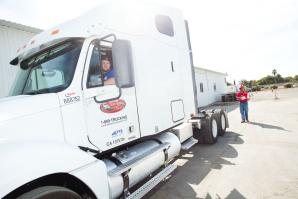The trucking industry is facing a significant driver shortage as baby boomers retire and younger people are unwilling to replace them. The shortfall eased a bit during the recession as fewer trucks took to the road, but with the economy recovering, industry leaders say the shortage is becoming problematic.
The American Trucking Association predicts the industry will be short approximately 110,000 drivers by 2014, while other estimates peg the figure up to three times higher. That deficit has been paying dividends for those who remain.
“Driver salaries are on the rise,” says Michael Shaw, a spokesman for the California Trucking Association. “Demand is outstripping supply.”
That is good for drivers but not so much for consumers: Most industry experts believe the increased driver costs will ultimately mean higher prices for the goods they deliver.
There are many reasons for the shortfall. Younger people aren’t as interested in the field any more. In this era of health consciousness, the job is perceived as too hard on the body. And long-haul truckers can be required to be gone from home for weeks at a time.
The financial payoff is also questionable. Many large companies prefer to hire truckers who own a rig, which can be an expensive proposition for a potential driver. And new regulations in California related to greenhouse gas emissions have made it even more difficult for truckers to afford equipment.
However, there are other signs that workers are enlisting in the field because job prospects are so poor elsewhere. David Decker, director of education for the Western Truck School in West Sacramento, says he has seen a slight increase in the number of students willing to fork over the $2,000 to $5,000 needed to pass his training program. He says it is too soon to know if the spike is temporary, but he remains optimistic that the industry will eventually be able to fill its needs. For all its challenges, he notes, trucking has something many industries can’t offer these days: job security.
“It’s harder than ever to make a living now,” Decker says. “But I’m seeing a lot more people coming here now who have already had careers in other fields. They’re coming here because they just need a steady job.”
Recommended For You

$30 Million Gamble
Port expansion project has uncertain future
The ports of West Sacramento and Stockton are betting that a $30 million public investment in new infrastructure will convince local importers and exporters to transfer their method of goods movement to the San Francisco Bay from trucking to barge shipping.

Slim Pickings
A shortage of farm labor impacts food harvests
Coasting through the sweeping fields of California’s Central Valley, it’s not unusual to spot collections of crouching figures diligently tending crops. These primarily Hispanic immigrants prune, thin, harvest and grow much of California’s renowned produce. But over the past decade or so, hundreds of thousands of these indispensable farm workers have vanished.


